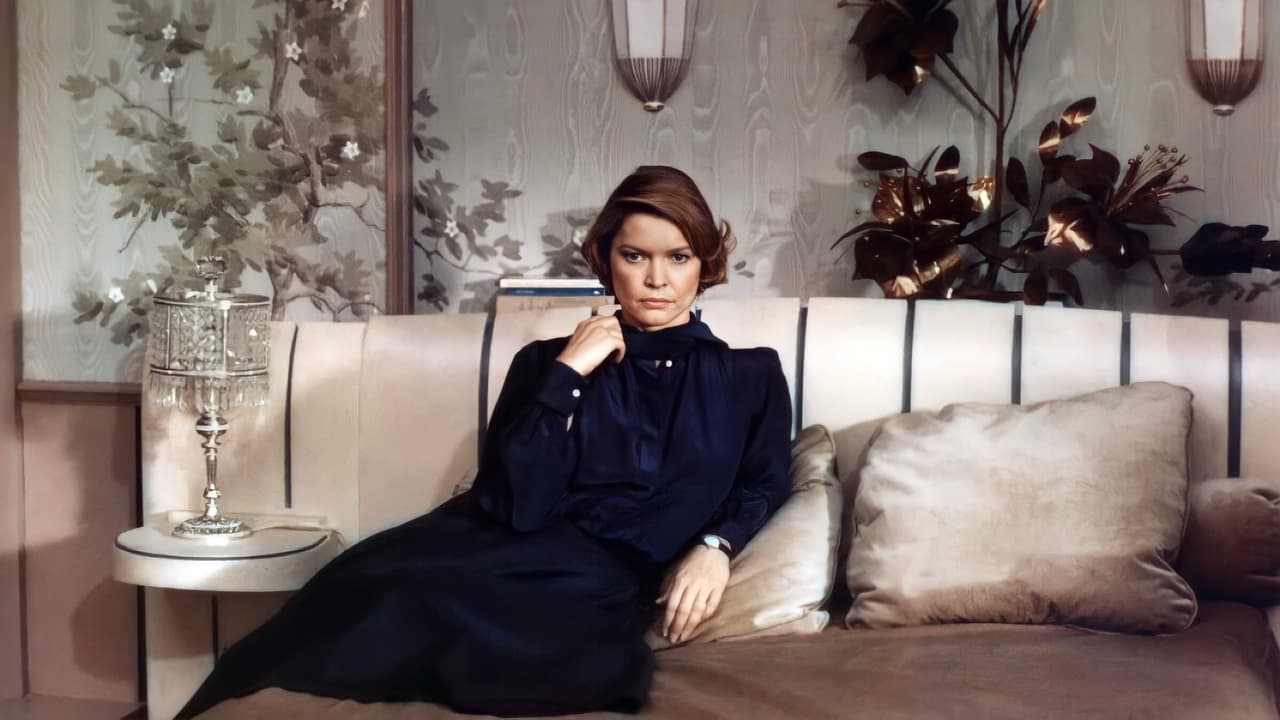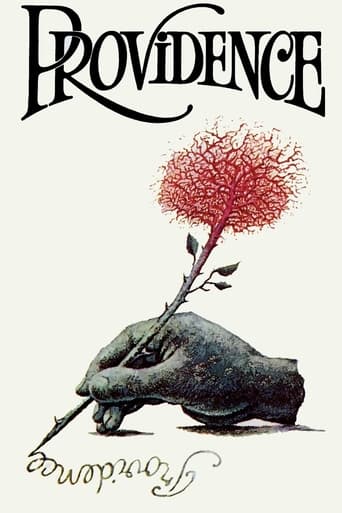

Although it has its amusing moments, in eneral the plot does not convince.
... View MoreIt's the kind of movie you'll want to see a second time with someone who hasn't seen it yet, to remember what it was like to watch it for the first time.
... View MoreExcellent characters with emotional depth. My wife, daughter and granddaughter all enjoyed it...and me, too! Very good movie! You won't be disappointed.
... View MoreIt's simply great fun, a winsome film and an occasionally over-the-top luxury fantasy that never flags.
... View MoreThis unusual drama, with its own mood and style, is about a dying, mean-spirited, bitchy ex-(?)Marxist writer who comes up with a fantasy scenario that involves the members of his family. There is nothing confusing about the movie; it becomes obvious very early on that Bogarde is his son in real life, that Burstyn is Bogarde's wife, and Bogarde's mistress is Gielgud's dead wife i.e. Bogarde's own mother (who killed herself years earlier because she had cancer - but I think it's more likely that being married to a cranky, foul-mouthed Communist did her in, i.e. gave her the cancer in the first place). Only the identity of the fourth member, David Warner, becomes revealed much later, only minutes before the Birthday lunch scene.I don't know if this was intentional or whether it was my subjective (read=objective) take on it, but "Providence" has a final end-twist that makes the viewer realize that he's been fooled by the old crack-pot's narration. Gielgud's semi-hallucinated dream-story presents Bogarde as the ultimate villain, a supremely egotistical "prig of a son" who is devoid of emotions and empathy. Ironically, it turns out much later that Bogarde is a well-mannered, well-balanced, good-natured man who shows infinite patience toward his father and his nastiness and eccentricities. We find out that Gielgud is the only family member that has a spiteful, selfish personality. Everyone else seems to be alright - at least in the presence of his royal Highness the dying scribbler.Gielgud plays an aging, disillusioned Leftist who predictably considers the bourgeoisie the root of all evil - while sitting pretty in his castle of a home, sipping expensive wine, servants following his ever whim, and with a probably very large bank account in Switzerland. A rich Marxist? Not exactly rare; don't think this to be an oxymoron, because it certainly isn't: a much too common occurrence on both sides of the Iron Curtain to warrant that term. However, if you think he is disappointed with the core of Socialist philosophy, think again: he is merely angry with "the (other) revolutionaries, not the revolution" itself. Hence, at the ripe old age of 78 this decrepit, evil old "intellectual" has learnt nothing, i.e. has remained ignorant, preparing gradually to die ignorant. So ridiculously deluded is this writer of (possibly cheap) novels that he actually chastises his son Bogarde for being a law-abiding, useful member of society. Gielgud, like all couch revolutionaries who only dabble in theory and consider the world a mere playground for their extremist/Utopist ideas and experiments, considers his son's "bourgeoisieness" to be the ultimate waste of one's energy and potential. Anarchy, violence, tyranny, and the imposing of one's own systems of thought - those are the things this writer believes in.In the final scene, Gielgud also reveals that he is the only (living) family member who uses the "F" word in nearly every other sentence, like some primitive, inebriated, wife-beating truck driver. He doesn't behave so much as an intellectual as he resembles an old wreck hanging on to his life dearly, a wretched existence that has no further purpose than to moan, belittle others, and perhaps churn out the occasional novel. His fantasy-world is so sick and full of malice that he actually pairs up his dead wife with their own son. This could be seen as an indication that Gielgud is not only physically ill, but perhaps mentally as well. Maybe his body isn't being eaten away by a virus or cancerous cells but by his own evil, borne out of pent-up frustrations and self-hatred. (He never got to win a Nobel Prize... Boo-hoo-hoo. I guess other Marxist writers must have had better lobbyists, huh? For those of you who aren't aware: that million-dollar prize almost always goes to Left-wing writers. I guess there are worse ways to finance Socialist propaganda...) "Providence" has some decent photography, fairly interesting dialogue, and a good soundtrack. It does tend to get bogged down toward the end of the fantasy part: after all, the characters had been established long before and tended to merely wonder around aimlessly before Gielgud finally stopped fantasizing and brought us into the real world.It was hilarious to read Roger Ebert's review of this film. The fat nincompoop actually finds the old man's behaviour touching at the end. Ebert fails to mention any negative sides, hence I must wonder which of the two of us saw the real movie, and who imagined a fantasy version of "Providence". Perhaps Ebert saw a bit of his own vileness in the old man's behaviour...It's a good movie, but not great by any means. The main reason, I guess, why it's held in such high esteem in certain circles is that a French director is behind it - and we all know how utterly FLAWLESS they are: everything they touch must require every single one of us to exclaim "genius!" in a French accent. The other reason is that the words "revolution" and "bourgeoisie" get mentioned in the same breath, and that usually gets movie critics all wet down there.
... View MoreSince so many good comments have been written here, mostly on the psychological side of the characters, and they are all excellent, I decided to comment upon a very present entity and that is WINE.Notice that, until the last scene, everybody drinks white, mostly CHABLIS, an acid one. But on that last scene Resnais shifts to RED. It is no accident, it has in my modest opinion, a way that illustrates a very fundamental change in the feelings that occurred in that lunch.Criticism and over-analysis, ever present till that event, give way to peaceful acceptance of the characters by the father, Without hypocrite sensibility, that he refuses, but with warmth and tolerance.Well, I do believe, by some 55 years of experience, that white wine (dry, European style) makes one restless and sometimes bitter.Red wine makes one more relaxed and happy.I do not know which kind of wine Resnais prefers, but since he is a Breton I would not be surprised, that it is WHITE. Maybe that is the reason why His movies are so difficult to decode. They are also some of the most magnificent works of cinematic art..
... View MoreProvidence is not an intellectual or artsy film, in the usual meaning of the word 'intellectual'. Is more a literary movie that experiments with the idea of an author, who is not only a novelist, but a playful and cynic god. In this sense, Providence is reminiscence of an idea exposed by the great Spanish writer and thinker Miguel de Unamuno in his novel Niebla: the author can play God inside the world of his creations, make fun of his characters worries, reactions and words.In Unamuno's novel, the idea is exposed with undeniable clarity. In Providence is far more complex, because there are also more psychology, absurdity and surrealism. Viewers can find a sarcastic but profound treatment of problems like adultery, Oedipus Complex, family hatred, social classes, pessimism and murder.But, in my opinion, Providence is a great film, not by Resnais pompous direction or by the much complicated literary ideas exposed in the story: this film contains one of Dirk Bogarde's and John Gielgud's best performances ever. Bogarde, the master of extreme elegance and excessive but charming mannerism, and Gielgud, with his mastery in giving words an independent life -as Derek Jacobi does-, bring humor and irony to this very pretentious work of Resnais.
... View MoreDon't be put off by what people (including lovers of the film) say about its initially being confusing. Even the first time through, it is madly enjoyable second by second, and it needn't take long to figure out what is going on. In fact, once you know that we are into a dying man's dreams/fantasies/wishes regarding his own family, you have all you need to make sense of virtually everything straight off. By the end, everything has locked into place in a most satisfying way. The contrast between the man's dreams about his family and what you see when they appear in person near the end is one of the most delicious things in the whole of art.
... View More